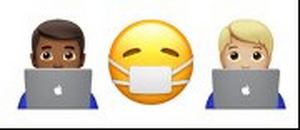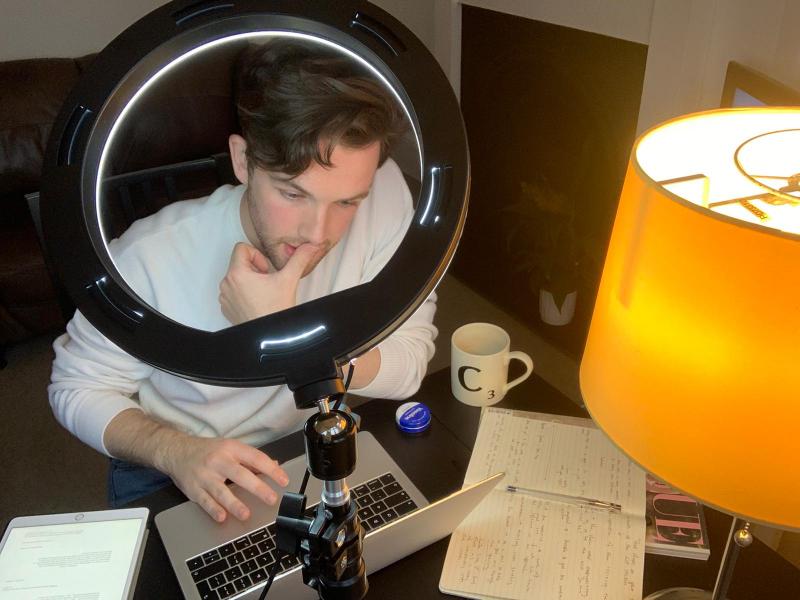Review: ((EMOJI PLAY)) at Solas Nua Theatre
Theatre Returns on Zoom

One of the major non-human casualties of the pandemic has been the theater world. Without a way to safely gather performers and audiences, theaters went dark this spring and most have yet to reopen in any capacity. For the 2020-2021 theater season, though, a number of companies are trying to adapt, utilizing technology to allow for virtual gatherings and performances.
Solas Nua Theatre's new ((Emoji Play)) (apologies to our friends at Solas Nua Theatre, but our publishing program cannot display emojis, but the title is the emojis in the photo attached) leans into that - not only in adapting to a Zoom format, but incorporating the pandemic and resulting circumstances into the show itself, while also showing how some aspects of life, love, and friendship remain constants no matter the circumstances. The play centers around Da'Von Moody (actors used their own names in character), who is teaching a course on digital language, and Cormac Elliot, his friend whose guest lecture is interrupted by constant messages from his ex-boyfriend, Ashton. The play unfolds during Da'Von's class (in which the audience serves as the students) over Zoom and a WhatsApp chain, and the audience is asked to weigh in on not only the course materials, but also the friends' disagreements and relationships.
.jpeg)
As a concept, the show, written by DC's Jeremy Keith Hunter in partnership with deviser John King, has a lot of promise - the premise of both the course and the interruptions are fascinating, and the physical distance of Da'Von being based in DC with his co-teacher in Ireland is an accurate reality for a lot of people who have been scattered by the pandemic and are now calculating phone and video calls across multiple time zones. Unfortunately, there's a degree to which staged reality moves too far into feeling artificial, which was too often the case here. The "class" starts with Da'Von in a towel, changing behind objects in his room as he begins introductions to the course. While plenty of us have likely been in various states of undress during a video call over the past seven months, we all can agree that this is precisely the benefit of the ability to turn the camera off. Plus, this is a course for which Da'Von is supposedly charging students to join; it's hard to imagine this being a particularly successful business venture if he's figuratively and literally caught with his pants down. Likewise, while it's believable that Cormac was ambushed and didn't realize the class had started when he first joined and told Da'Von about his ex-boyfriend's messages, it's a bit difficult to buy how quickly and completely this supplanted the actual course: there was one introductory exercise, and Cormac later provided a brief commentary about language, though this was delivered while Da'Von oddly left in the middle of the 45-minute class to use the bathroom - clearly a power move against Cormac, but quite unbelievable for a course instructor relying on continued enrollments for income.
It's possible I'm reading too much into it. Cormac's relationship woes hit uncomfortably close to home. The situation was eerily similar to a breakup I recently coached a friend through, and the reasoning behind it was unnervingly akin to the reason my last relationship ended - which is to say, the emotional complexity of the show was realistic and relatable. But the more I thought about this show, the more questions I had: How long was Cormac in the US? Why did he go back to Ireland after the breakup? Was it because he wanted to see his family and lost his place to live (since he and Ashton lived together), or was he deported? (It's mentioned that Ashton worked at the White House, presumably under the current administration, and paid for Cormac's flight.) What about his job? Presumably he did something besides consult on Da'Von's videos. How long ago was the breakup? Was this all in the immediate aftermath, or a month later? Three months later? Was there a silent period before this, or has he been texting nonstop for weeks? Could constant attempts at communications mean that we're seeing Cormac at his breaking point, or is this a newly surfaced attempt at outreach, breaking whatever fragile peace he may have had? These questions make it difficult to fully grasp the emotional core of the show, because there are simply too many unknown factors for the audience. Also, the constant dings didn't quite match Ashton's messages as read to the class by Cormac later in the show.

What my overthinking amounts to is this: the show has a lot of potential, but is woefully underdeveloped in some areas, in a way that takes the audience out of the experience. This is also reflected in some of the technology. There isn't a way to confirm your phone number is correct for the WhatsApp thread, so any technical issues on that end mean you've missed part of the show. Also, despite very clear instructions on how to set your Zoom to focus on the actors, there aren't any explicit instructions about when to have your camera off, so audience members kept popping on and off screen, looking very confused as to whether they should be there, plus instructions were given for hiding "self view," which meant some didn't necessarily realize they were visible. Additionally, the actors did occasionally instruct people to turn cameras on, but it wasn't clear how long this was expected for reactions, nor was it clear whether comments in the WhatsApp thread were limited to Da'Von's whimsical timing for responses or were meant to continue throughout the performance; the lack of direction led to the thread becoming more of a distraction from the show than a supplement to it.
If I'm being critical, it's more out of an interest in seeing this production do well - I've been as hungry for new shows as I'm sure many theater fans have been. And this particular show has the creativity, resourcefulness, and talent to bring us what we've been missing. But the underdeveloped back story, the shaky premise, and the technical issues (though, to be fair, those can be resolved following trial and error) make the experience fall short of the expectations the production's potential sets for it.
Solas Nua's ((Emoji Play)) is running online through October 11. Tickets and additional information on the show's Eventbrite page for $20. Zoom is required for viewing and WhatsApp is recommended for participation.
Reader Reviews
Videos

